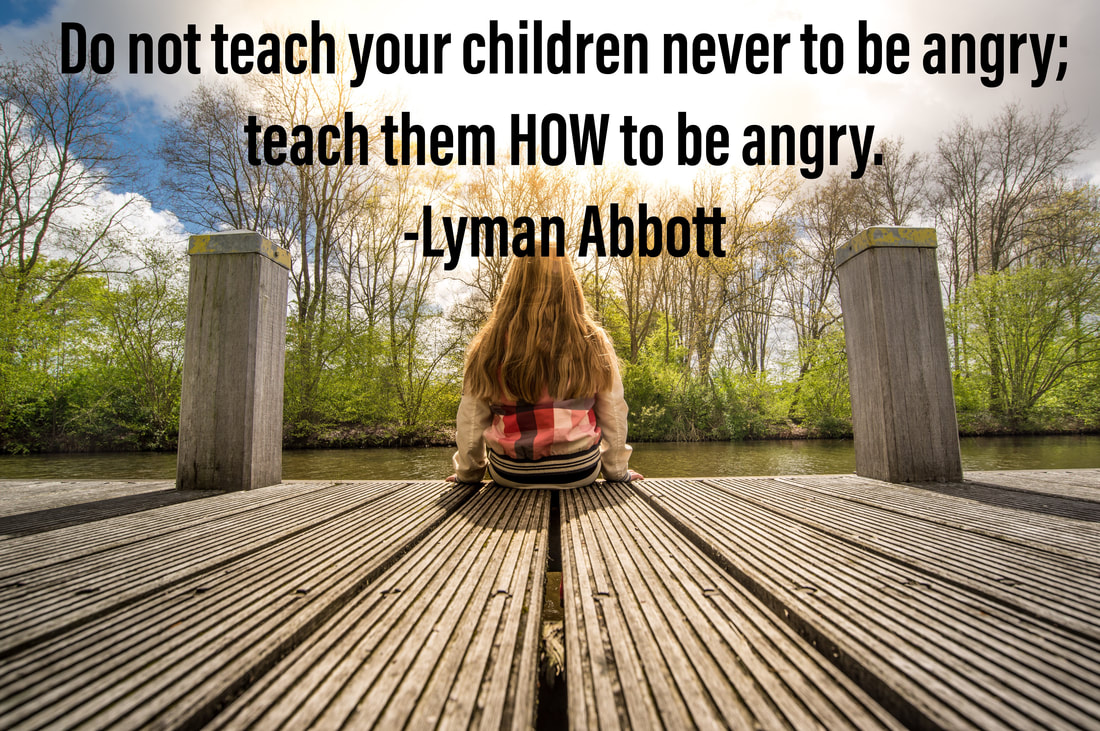|
Anger can be a difficult emotion – even for adults. As parents, your job is to give your child the tools they need to process/express their emotions effectively. Instead of letting anger cause destructive behaviors, help them understand their emotions and deal with them in a healthy, productive way.
1) Identify your emotions: Before a child can start to manage their anger, they need to be able to recognize their anger. Labeling emotions should start at a young age. It is important for children to understand that feelings and emotions are ok – even anger. Explain that it is ok to feel angry or frustrated but it is not ok to act destructively. It is ok to feel angry if your sister takes your toy but it is not ok to hit your sister or throw your toys. “Ok” and “Not ok” are easy, clear labels for children to understand. 2) Investigate the reason behind the anger: If your child is experiencing anger or lashing out often, there may be an underlying issue to address. There are many different reasons why a child may feel angry. Some examples may be bullying at school, lack of attention, feeling misunderstood, issues at home (divorce, loss, new baby), etc. If you’re able to pinpoint a reason, start to use constructive problem solving to help remedy the situation. 3) Develop coping skills with your child: Teach your child to make healthy choices as soon as possible when they start to feel angry. Once they recognize they are feeling angry, there should be a plan in place. This could be walking away, deep breathing, coloring, reading, etc. 4) Model appropriate behavior: If you have a habit of losing your temper, be aware that your children will often model this behavior. It is easy to stay calm when things are going well but it takes effort to stay calm when things get frustrating or out of hand. As hard as it may be, stay calm and in control of your emotions so that you can be a positive role model for your child 5) Make sure you are not rewarding angry outbursts: Sometimes children may have an angry outburst because they have been taught that it is an effective, quick way to get attention or get what they want. Often times (especially in public), parents will give the child what they want to quiet the situation and avoid unwanted attention from others. Try not to give into your child’s temper tantrum. Rewarding bad behavior can encourage worse behavior. 6) Create a “Calm Down Kit:” This kit serves as a tool box with activities or other items to help encourage them to take responsibly for their emotions. Some great ideas for your kit are stress balls, coloring books, crayons, putty, and puzzles. 7) Promote empathy: Once the situation has calmed down, use that opportunity to start a conversation with your child. “Remember when you were frustrated and you hit your brother? Has anyone ever hit you? How did that feel? How do you think it made your brother feel? What can you do next time you get frustrated with your brother?” Help them to see how others feel about their actions. 8) Utilize positive reinforcement: Praise them for positive behaviors. Some families even find it helpful to use a reward system, such as tokens or points, which they can redeem for a treat or new toy. 9) Use communication: If your child is having frequent, predictable outbursts around the same times such as bedtime, time to turn off video games, homework time, etc. it can be effective to establish time warnings. This would mean stating, “In 5 minutes, it is time to turn off the Xbox and do homework.” Communicate your expectations and hold your child to them. 10) Establish consequences: Used effectively, establishing consequences can be one of the most useful tools in helping you and your child deal with anger. Consequences are used to decrease undesirable behaviors. An important point to remember is to give consequences based on the bad behavior and not the feelings of anger. These consequences should be easily enforced and thought about head of time. Examples are loss of privileges, loss of toys or electronics, or short time outs (or “time ins”). If you are having a difficult time helping your child develop healthy anger management skills, don’t hesitate to seek professional help. Therapists can help identify any underlying issues your child may be experiencing. Therapists can also help teach appropriate strategies and coping mechanisms to children of all ages.
2 Comments
BH
1/18/2019 10:39:16 pm
Great post! Thanks for the tips!
Reply
Jon
1/24/2019 11:19:07 pm
Thanks for the kind words!
Reply
Your comment will be posted after it is approved.
Leave a Reply. |
AuthorAll Counseling Solutions is focused on helping families and individuals find hope and solutions through proven therapeutic counseling techniques.
Archives
March 2021
Categories |
Professional, Dedicated, Solution-Focused Counseling in Macon, GA
What Our Clients Are Saying
"I initially was unsure and embarrassed to reach out for help but I took a leap and am extremely happy that I reached out to Jon. He is a fantastic counselor and I truly felt heard. He took the time to problem solve with me. I felt like he really cared about what was going on in my life. Two thumbs up for All Counseling Solutions!"
|
Contact Info
Call Now with Any Questions: 478-973-4117
Email: [email protected] Address: 193 Pierce Ave. Macon, Georgia 31204 |


 RSS Feed
RSS Feed
